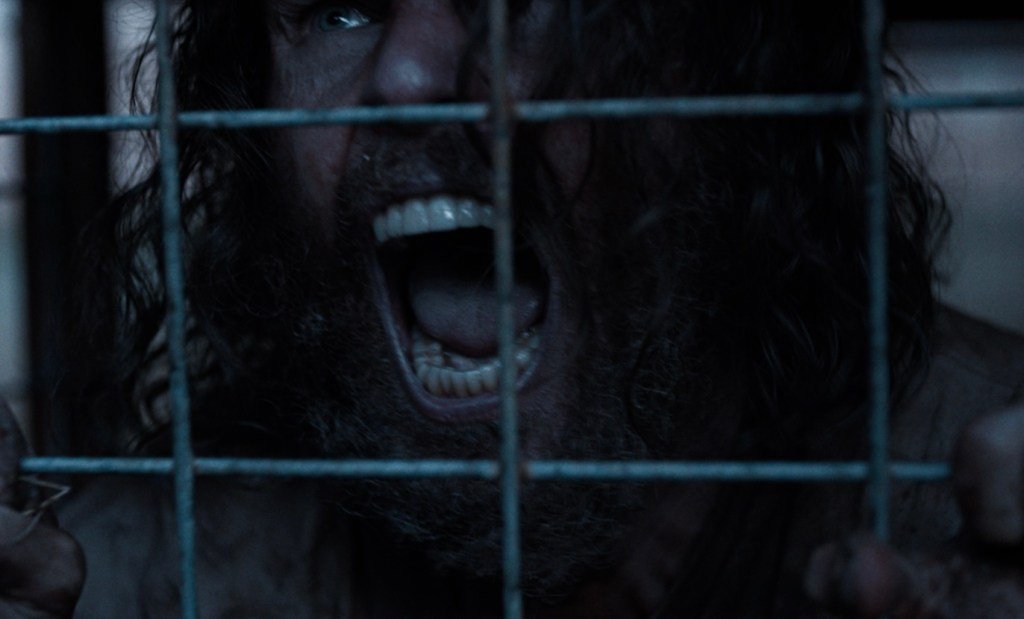THE SEEDING is a hungry feature debut
The Seeding
Written and Directed by Barnaby Clay
Starring Scott Haze, Kate Lyn Sheil and Alex Montaldo
Unrated
Runtime: 94 minutes
In theaters and VOD January 26
by Alex Rudolph, Staff Writer
The desert, at least the version that exists in fiction, sucks. As the new horror film The Seeding opens, a child is eating the meat off a severed human finger, and if you have seen enough movies, especially non-Westerns, that take place in deserts, you may think Of course he's doing that, this is a desert. The entire Ozploitation genre is built around the horrors of wide open, hostile spaces. So much horror is about people leaving urban areas for rural ones, and characters exploring the countryside or isolated cabins are infinitely more likely to survive their trips out of the city than the poor suckers who wander into the desert. As with so much horror, The Seeding begins with classic genre signifiers and pulls you in with the promise that it's going to take those ingredients (an endless wasteland, dangerous kids, etc) somewhere unexpected. It doesn't quite deliver the unexpected, though, remaining a workmanlike horror-thriller. And I'd be more than happy with that, if the hints at something weirder weren't dead ends.
Once we've spent a minute with the cannibalistic kid, we meet a man played by Scott Haze, wandering the desert with a camera, already lost, even if he won't realize it for another five minutes. He comes across a crying teen who turns aggressive when Haze offers help. The moment doesn't hit because we've just seen a younger person eating a finger, which is, unfortunately, how some other potentially impactful moments are squandered in The Seeding. Something unsettling happens and then the movie immediately, confusingly asks "But what if something significantly less unsettling were happening instead?"
To his great credit, writer-director Barnaby Clay isn't using his feature film debut to make an "elevated" horror film. The Seeding looks and feels like exploitation, especially that early Wes Craven exploitation, and it's a relief. Clay isn't simply making a limp drama with a heavy atmosphere that never coalesces around anything solid. He isn't Oz Perkins or Floria Sigismondi. This is a dirty, grungy movie that gets visceral at times.
Haze's character sleeps in the desert, shivering and half-awake, prepared to try to get back to civilization in the morning, but wakes up to a woman (Kate Lyn Sheil) singing and walking into a house he hadn't initially noticed. He climbs a ladder down into the small canyon to the house, and the film then trades its Blair Witch Project vibes for The Hills Have Eyes ones. Once he's down in the canyon, Haze's character isn't able to get out. Somebody's pulled the top of the ladder away by the time morning comes and Sheil's character treats the lack of an exit as if it were normal. He tries to climb away from the canyon while she's resigned to living in it. There are kids up top, around the rim of the canyon, keeping them trapped. Made-up languages are spoken and the passage of time is marked by phases of the moon rather than calendar dates or days. There's a big twist you'll guess if you spend even five seconds thinking about the film's title.
I always like horror stories where kids take over, and these stories are instantly more disturbing when the kids round up adults. Lord of the Flies is dark enough when the kids are subjugating each other, but other canonical classics like Village of the Damned and the Twilight Zone episode "It's A Good Life" are more upsetting because the youth have broken the natural hierarchy we've all been born into. It's scary when Jason Voorhees wipes out a summer camp, but it also makes sense because he's seven feet tall, ripped and immortal. He is physically overpowering. Clay's villains are children and teenagers, some dressed like they just put Road Warrior outfits together with whatever they had on hand. None of them look like they could ruffle a hair on Scott Haze's head in the real world, and yet, all of them are terrifying. Clay does a good job at immediately establishing who's in control and the extent to which they'll stay there.
Sheil, too, is incredible. I last saw her in She Dies Tomorrow, which I loved, and her performance here (and I know this is a very bland compliment) makes sense. Because a bunch of kids 15 and younger holding a woman in her mid-30s captive does not make sense. Her predicament feels impossible but she plays it like she's lived in it too long to notice.
There ultimately aren't many answers to the movie's weirder questions (what is this language being spoken, where did this woman come from, etc.). I don't need answers. I would like, however, for the level of disquieting oddness to stay consistent. When so many things early in The Seeding throw you off-balance, it can be disappointing to then watch everything wrap up as you'd expect an hour later. It feels like a waste of an intriguing set-up.
Clay’s done enough right here that I'm interested in where he goes with a second feature. The Seeding looks great and–before you know what's happening–is intriguing. In that way, he's like one of his film's maniac teens: there's so much potential there, even if they've made some iffy choices. But they're young. There's time to shake it off and mature.


